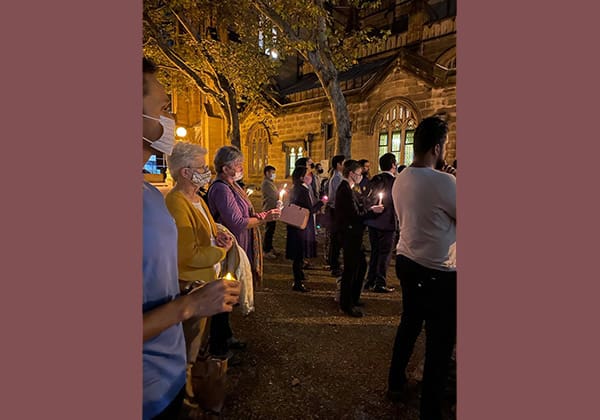The experience of being both Australian and Indian has become evermore dissonant in the face of the COVID-19 pandemic. With Sydney having entered a second hard lockdown, “pandemic fatigue” has become an accepted reality that has long since lost its novelty.
For immigrant families, the fatigue is stretched thinner. Harbouring concern for loved ones in India whilst coping with both the immediate reality in Sydney is mentally exhausting, and can often feel uniquely isolating.
The past few weeks (and months) have been characterised by continual Whatsapp calls and messages with family members. Days are saturated with an endless stream of information of the pandemic’s impacts across borders. Household conversations revolve around how loved ones have been falling ill, been denied testing, received false and swapped results, retrospectively diagnosed, denied treatment, and endless debate surrounding misinformation shared via messaging services and media platforms.
We hear about our distant relatives, our parents’ college friends, their old roommates, their neighbours. The characters, recalled fondly, are often new to us and offer a peek into the past lives of our parents. The stories, however, are almost always the same, steeped in tragedy and loss, leaving a bittersweet aftertaste. Even across oceans, grief hangs heavy in the air – thick and suffocating.
“Four days after I had COVID, [my mum] had COVID … hospitals were overcrowded. They were encouraging us to isolate and get better at home as much as possible,” says Annabel Elizabeth, an international student studying Architecture at USyd. Annabel returned home to Bangalore in December 2020 to support her family, in the hope that she would be able to return to Sydney prior to commencing Semester 1. However, stringent travel restrictions placed on incoming travellers from India left thousands, including Annabel, stranded. For many international students, this has meant a tough decision between studying remotely and being with family, or deferring their studies and plans of returning to Australia.
For Annabel, her choice to defer her studies was characterised by an excruciating process trying to justify specific reasons for deferring. It quickly became demeaning for her, living through the harsh reality of COVID: “I think it’s pretty unfair, especially for people who are overseas … I’m stuck somewhere else and I do not want to be paying such high fees to just sit at home and take the course online.”
USyd still has a ways to go in accommodating the less-than-ideal learning conditions of students studying remotely or who have loved ones affected by COVID. Beyond receiving extra time to complete coursework, there are few long-term support measures for students, even if they are recovering from COVID.
“Your body is still recovering […] you’re still tired all the time … it is a challenge to work through the assignments,” says Annabel.
International students were not alone in their anxieties about COVID, only further heightened by financial strain. Harsh Chugani has lived in Australia for almost seven years, working in the hotel industry. Like other visa holders and immigrant workers, Harsh received no government financial support for almost 16 months after the initial lockdown in March 2020, and was forced to use his annual leave. This lack of support undoubtedly hits hardest for immigrant workers that make up a large portion of essential workers.
“Think about your entry, lower level groundwork. Who is cleaning these quarantine rooms? … Not locals, not Aussies; the immigrants … the ones that couldn’t afford to do anything else,” explains Harsh.
When Harsh’s mother, living alone in Pune, contracted COVID in May, the ban placed on travellers from India meant Harsh was unable to physically care for her, as he would not be able to re-enter Australia: “How would you feel if you [didn’t] know when you’ll be able to hug your mum again?”
Many are anxiously waiting for international borders to reopen for a chance for loved ones, specifically parents, to be able to travel to Australia. The Migration Act notably omits parents born overseas from their definition of ‘immediate family’; a petition to introduce a special category of exemptions for parents has gathered more than 70,000 signatures.
A 21,000-strong Facebook group called Parents are Immediate Family have organised an Australia-wide virtual protest to draw attention to the issue. Many members bond over their experiences, saying how they feel frustrated at submitting multiple exemption requests to bring their loved ones to Australia, even for extenuating circumstances like terminal illness. In contrast, many migrants in Australia are likening their experience to being ‘prisoners,’ with exemptions to leave for their home countries being incredibly hard to obtain. One member of the group wrote: “I am not feeling trapped, I am trapped.”
For many immigrant families, this pandemic is encompassed by a sense of limbo. While individual responses are vast and varied, families are largely suspended between the extremities of engaging heavily with the pandemic in India, and coping with the realities of lockdown in Sydney. Responding to the anxiety feels like an endless cycle: the instinctual concern and fear for relatives and family, the subsequent helplessness of the travel ban and lastly, distancing from any news of COVID in India that ultimately feels like a luxurious act of self-preservation, if only for a moment to breathe.
The question remains, as Harsh puts it: “Do I open up myself and pour everything out? Or do I put on a brave face and hope that everything is going to be okay?”





